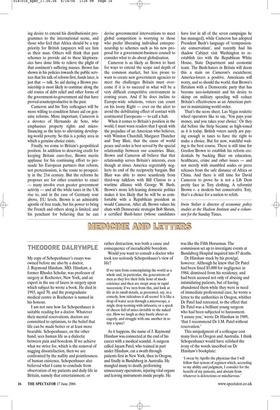MEDICINE AND LETTERS
THEODORE DALRYMPLE
My copy of Schopenhauer’s essays was owned before me also by a doctor, J. Raymond Hinshaw, MD. Hinshaw, a former Rhodes Scholar, was professor of surgery at Rochester, New York, and an expert in the use of lasers in surgery upon which subject he wrote a book. He died in 1993, aged 70, and the postgraduate medical centre in Rochester is named in his honour.
I am not sure how far Schopenhauer is suitable reading for a doctor. Whatever their mental reservations, doctors are committed to optimism, to the belief that life can be made better or at least more bearable. Schopenhauer, on the other hand, sees human life as a dialectic between pain and boredom. If we achieve what we strive for, which is the removal of nagging dissatisfaction, then we are confronted by the nullity and pointlessness of human existence. Schopenhauer also believed what I came to conclude from observation of my patients and daily life in Britain, namely that entertainment, or rather distraction, was both a cause and consequence of ineradicable boredom.
Would you want to consult a doctor who took too seriously Schopenhauer’s view of life?
If we turn from contemplating the world as a whole and, in particular, the generations of men as they live their little hour of mockexistence and then are swept away in rapid succession; if we turn from this, and look at life in its small details, as presented, say, in a comedy, how ridiculous it all seems! It is like a drop of water seen through a microscope, a single drop teeming with infusoria; or a speck of cheese full of mites invisible to the naked eye. How we laugh as they bustle about so eagerly, and struggle with one another in so tiny a space!
As it happens, the name of J. Raymond Hinshaw was connected at the end of his career with a medical scandal. A surgeon called Jayant Patel, who trained in part under Hinshaw, cut a swath through patients first in New York, then in Oregon, and finally in Bundaberg in Australia. He mangled many to death, performing unnecessary operations, injuring vital organs and leaving instruments inside people. He was like the Fifth Horseman. The commission set up to investigate events at Bundaberg Hospital inquired into 87 deaths.
Dr Hinshaw stuck by his protégé, however. Although he knew that Dr Patel had been fined $5,000 for negligence in 1984, dismissed from his residency, and had been accused not only of abusing and intimidating patients, but of having abandoned them while they were in need of immediate professional care, he wrote a letter to the authorities in Oregon, whither Dr Patel had retreated, to the effect that Dr Patel was a brilliant young surgeon who had been subjected to harassment. ‘I assure you,’ wrote Dr Hinshaw in 1989, ‘that I recommend Dr J.M. Patel without reservation.’ This misjudgment of a colleague cost many lives in Oregon and Australia. I think Schopenhauer would have relished the irony of the words inscribed on Dr Hinshaw’s bookplate:
‘I swear by Apollo the physician that I will follow that system of regimen which, according to my ability and judgment, I consider for the benefit of my patients, and abstain from whatever is deleterious or mischievous.’


















































































 Previous page
Previous page